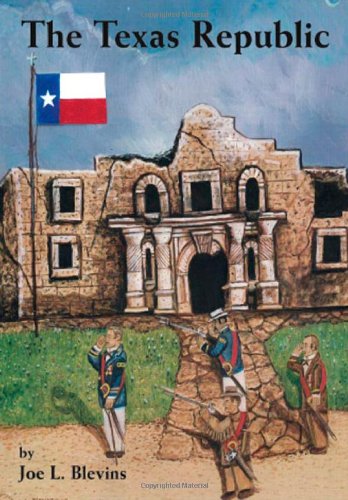- Date: 16.11.2008
- Book: The Texas Republic
- Author: plappen
Review
The Texas Republic, Joe L. Blevins, 2001, ISBN 1553691407First of a trilogy, this tells the story of the history of Texas through the diary of Andrew, a freed slave. Andrew and his wife, Delephine, leave Louisiana for Texas, to meet a man named Sam Houston. He will help them get their freedom papers and a land grant. They are attacked by robbers along the way. Delephine is killed, and Andrew is badly wounded. He is found by a Cherokee hunting party, who nurse him back to health. He becomes an official member of the tribe, and marries Say-te-Qua, the tribes dream interpreter.
After a stint in the Texas army, fighting Mexican troops led by Santa Ana, Andrew is discharged and given a plot of land to start his own homestead. His Cherokee brother-in-law, Red Bird, and his wife, Ke-Ke, have a nearby homestead. Whether its planting and harvesting corn, cotton or vegetables, the work is long and hard, but Andrew and Red Bird do pretty well for themselves. They never go hungry, and are able to barter for what they want with the local tribes or at the nearby Army fort. Under President Houston, relations are pretty good with the Indians.
Houston is forbidden by Texas law to run for another consecutive term as President, so a man named Mirabeau Lamar succeeds Houston. Lamar is the sort of person who would rather flood Texas with settlers, pushing the Indians off their land, or just kill them outright, than deal with them fairly. A couple of instances of groups of Indians being invited to peace conferences, then slaughtered, bring relations between them and the settlers almost to the point of collapse. Also on the point of collapse is the official Texas economy. War-related debts cause the exchange rate of Texas money to plummet, and force Andrew and Red Bird to stick to barter.
President Houston returns to power, to great sighs of relief. He calls for a peace conference of all the Indian tribes in Texas, to sign an overall peace treaty. Its a summer-long affair, with the various bands and tribes camping on several hundred square miles of land. Andrew and Red Bird are among the organizers. All of the tribes eventually sign the treaty, though some are reluctant signers. The book ends with the people of Texas debating whether or not they should give up their independence and become part of the United States.
Since this story is told in the form of a diary, the writing is kind of dry. But for anyone interested in 19th century American history, specifically the early history of Texas, this book is recommended. Its based on actual events, and certainly gives the feeling like it was written 160 years ago.
Recent actions
-
toryah1988 has added Harry Potter And The Order Of The Phoenix to their read list.
-
toryah1988 has added Harry Potter And The Goblet Of Fire to their read list.
-
toryah1988 has added Atonement to their read list.
-
toryah1988 has added New Moon (The Twilight Saga) to their read list.
-
Monica has added The Da Vinci Code (Large Print) to their wish list.
